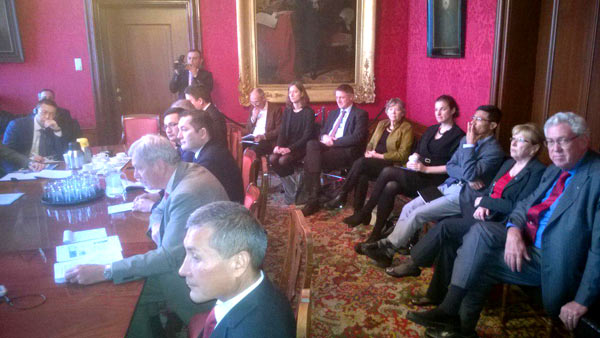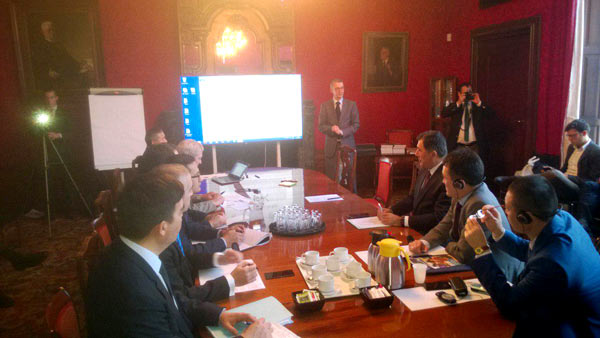ROUND-TABLE ON THE ARAL SEA CATASTROPHE
16 December 2016, Delft, the Netherlands
The round table was organized by the International Ground Water Resources Assessment Center (IGRAC, the Netherlands) in consultation with the Embassy of the Republic of Uzbekistan to Belgium. The event was coordinated by IGRAC Director Neno Kukuric and IHE-UNESCO staff – Joop de Schutter, Zaki Shubber and others.
More than forty representatives from three Central Asia countries and international organizations participated in the event. Particularly, Kazakhstan was represented by the Ambassador of Kazakhstan to Belgium and Head of Mission to EU Mr.Almaz Khamzaev and representatives of the Committee for Water Resources of the Republic of Kazakhstan; Tajikistan – by the Ambassador of Tajikistan to Belgium and Head of Mission to EU Mr. Erkin Rakhmatullozoda and Mr. Daler Kholmatov from the Ministry of Energy and Water Resources of the Republic of Tajikistan; Uzbekistan – by the Ambassador of Uzbekistan to Belgium and Head of Mission to EU Mr. Vladimir Norov and MFA staff Messrs. Nodir Ganiev and Nabidjan Kuvondikov. Messrs. Normukhammad Sheraliev, representative of Uzbekistan in EC-IFAS, and Vadim Sokolov, GEF Agency of IFAS also participated in the event. There were no representatives from the Kyrgyz Republic and Turkmenistan.
International organizations were represented by Mrs. Christina Leb, Senior water resources specialist at the World Bank, as well as by Royal Haskoning DHV Company (the Netherlands) and the Asser Institute (Center for International and European Law, the Netherlands), etc.


Mr. Vadim Sokolov, Acting Director of GEF Agency of IFAS, prepared key presentation for the participants of the round table on “Aral Sea: past and future, cooperation and measures needed to balance environment and socio-economic development in the basin”. He focused on 5 measures of the “Program of measures on eliminating the consequences of the drying up of the Aral Sea and averting the catastrophe of the ecological systems in Prearalie”, which specifies implementation of specific measures to mitigate adverse impacts of the Aral Sea catastrophe. It was developed by the initiative of the President of the Republic of Uzbekistan Mr. Islam Karimov under the chairmanship of Uzbekistan in IFAS. The Program was supported by the UN Secretary-General Mr. Ban Ki-moon and disseminated as an official document at the 68th Session of the UN General Assembly in September 2013:
- creating conditions for reproduction and preserving the gene pool in Prearalie;
- improving the system of management and conservation of water resources;
- maintaining natural watercourses in the Aral Sea basin and implementing comprehensive measures for afforestation of the dried bed of the Aral Sea and avert desertification in the region;
- preserving biodiversity, restoring biological resources, and protecting flora and fauna;
- further improvement of institutional framework and strengthening of regional cooperation under IFAS umbrella, as well as accelerating efforts aimed at attracting global attention to solving problems related to the Aral Sea catastrophe.
A vision for future cooperation was presented:
- Aral Sea Basin Program-4 (ASBP-4) should be based on regional and national projects of ASBP-3, which have not been completed yet.
- coordination of donors is required to avoid duplication and fragmentation;
- improvement of cooperation by strengthening existing institutions rather than by developing new ones;
- strengthening of cooperation tools – information exchange, capacity building, regional projects, modeling, and long-term planning;
- International Law is not only rules of general game but a language of cooperation;
- no need to approve a regional Convention of environment in order to avoid duplication of duties of the Interstate Commission on Sustainable Development;
- Water should the core of regional cooperation rather than the source of conflicts.
Then the Ambassador of Uzbekistan to Belgium Mr. Vladimir Norov delivered his speech on progress in solving problems of the Aral Sea during the chairmanship of Uzbekistan in IFAS (2013-2016). The Ambassador of Tajikistan Mr. Erkin Rakhmatullozoda also underlined this significant contribution. The Ambassador of Kazakhstan to Belgium Mr. Almaz Khamzaev focused on necessity of additional efforts in water conservation, particularly in the Syrdarya River basin.
In his speech, Mr. Sheraliev noted that EC- IFAS under the chairmanship of Uzbekistan started its activity with maintaining cooperation with international organizations, financial institutions and donors in order to attract their attention and efforts to the implementation of practical measures for mitigation of adverse impacts of the environmental disaster in the Aral Sea basin.
To this end, more than 200 meetings, negotiations and consultations were held at various levels; cooperation was streamlined with UN agencies(UNDP, UNECE, UNRCCA, UNEP, UNICEF, UNESCO, WHO, FAO, ESCATO), agencies on international cooperation (GIZ, SDC, TICA, ĘÎICA, USAID, JICA), international organizations (ICARDA, IWMI, CAREC), and international financial institutions (World Bank Group, Asian Development Bank, Islamic Development Bank), etc.
The representatives of EC-IFAS participated actively in many important international and regional events, where they attracted global attention to the problems related to Central Asia as a whole and the Aral Sea, underlined the necessity to consolidate efforts in attracting financial and technical support to the country-founders of IFAS in order to search the ways and mutually acceptable solutions to the existing problems.
As a result, international organizations and donors participated actively in programs and projects aimed at improving environmental, socio-economic and water management situation in the Aral Sea basin.
The total amount of ongoing and pipeline regional programs and projects was $195.29 million during the chairmanship of Uzbekistan in IFAS, i.e. fivefold more than during previous chairmanship of country-founders of the Fund.
In conclusion, the following recommendations were proposed for focusing on cooperation in the Aral Sea basin:
- Sustainable water resources management and implementation of information and communication technologies (ICT) at the basin levels.
- Improvement of efficiency and sustainability in irrigated agriculture. Application of advanced technologies in irrigated agriculture.
- Adaptation of river basin management in context of climate change and anthropogenic effects. Improved water security.
- Enhancement of studies and capacity building related to practical applications of tools for water, food and energy resources (for example, models as a common basic planning and framework for decision making process).
- Need to support upbringing of new generation “water leaders”.
In general, thanks to participation of representatives of EC-IFAS and GEF Agency of IFAS the following outcomes of the event may be mentioned:
- the participants were informed about activities carried out by EC-IFAS during the chairmanship of Uzbekistan and related to mitigation of adverse impacts of the drying up of the Aral Sea;
- the participants were informed about measures carried out by Uzbekistan when implementing the third Aral Sea Basin Program in 2011-2015 (ASBP-3);
- the participants were presented the “Program of measures on eliminating the consequences of the drying up of the Aral Sea and averting the catastrophe of the ecological systems in Prearalie” (Program of measures) developed by the Republic of Uzbekistan during its chairmanship in IFAS and disseminated as an official document on September 16,2013 at the 68th session of the UN General Assembly;
- issues related to attraction of global attention and investments were discussed with representatives of various international organizations and prospective donors to solve the problems in the Aral Sea basin and restore environment in Prearalie, etc.
V.I.Sokolov, N.Sheraliev
|